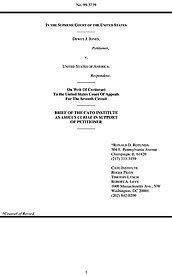Jones v. United States
Learn more about Cato’s Amicus Briefs Program.
Dewey Jones threw a Molotov cocktail into the living room of his cousin’s home, causing fire damage. Jones was convicted in federal court of one count of arson, one count of making an illegal destructive device, and one count of using a destructive device in relation to a crime of violence punishable as a federal offense (arson). He appealed his 35-year sentence as excessive and far larger than any sentence he would have received under state law. This Cato brief, joined by Professor Ronald D. Rotunda of the University of Illinois College of Law, argues that Jones’s act of arson was in no way connected to interstate commerce and thus the case was properly within state, not federal, jurisdiction. The brief further stresses that the Constitution establishes a government of specifically enumerated, limited powers, and that this case is a prime example of the federal government improperly using the Commerce Clause to expand its power to regulate.

This work is licensed under a Creative Commons Attribution-NonCommercial-ShareAlike 4.0 International License.



